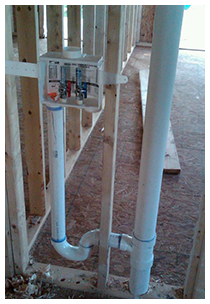Plumbing is an integral part of any home, so it’s important to understand the basics when something goes wrong. Having a few basic plumbing skills can go a long way towards preventing issues and repairing them quickly and permanently. learn more about residential plumbing to be prepared for any issue that arises.
The Basics of Home Plumbing
In most homes, plumbing involves piping systems, a hot water heater, and various fixtures. The drainage pipes may be located on the outside of your home, underground, or even within your walls. When something goes wrong with your plumbing, this could be anything from a blocked drain to a leaky pipe.
Identifying the Problem
The first step in identifying problems with your plumbing system is to determine what type of water supply you have in your home. Depending on where you live, you might have either a public water supply or a private well. Each of these requires specific types of fixtures, so knowing exactly what kind you have will help you better diagnose and fix any problems you might be having.

Common Residential Plumbing Problems
Clogged or slow-draining drains: Clogged and slow-draining drains occur due to debris such as hair and food scraps that accumulate over time. This can usually be remedied by “snaking” the drain with a special tool made specifically for this purpose. If the problem persists, it is likely due to an obstruction deep within the pipes which will require professional assistance.
Leaky faucets: Leaky faucets are another common plumbing issue caused by wear-and-tear, or an improperly installed washer. To repair a leaky faucet, you should first identify where the leak is coming from. Then, you can replace any worn parts or re-tighten any loose connections.
Signs of Serious Plumbing Issues
Although some minor plumbing issues are easy to fix, there are times when professional help is needed. Some signs that you have a serious plumbing issue include reduced water pressure, multiple plumbing fixtures backing up at once, or discolored water coming out of faucets. In these cases, it’s best to contact a licensed professional for help.
Preventative Measures to Take
Fortunately, there are several preventive measures you can take to avoid any major plumbing issues. These include regularly inspecting your home’s plumbing system for any signs of damage, adjusting faucet handles to prevent leaking, cleaning or replacing clogged filters, and using strainers in your sinks and tubs.
When to Call a Professional
If you don’t feel confident tackling the plumbing problem yourself, you should contact a professional plumber. They can assess the situation and make any necessary repairs or replacements to restore your home’s plumbing system. Be sure to ask for an estimate and recommended solutions before signing any contracts.
Residential plumbing can be daunting, but being knowledgeable and understanding the basics of home plumbing can save you time, money, and hassle. Whether you decide to take on the problem yourself or call a professional, keeping the tips above in mind will keep your home’s plumbing running smoothly and efficiently.




